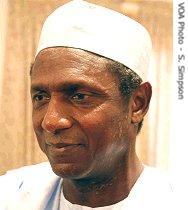-
(单词翻译:双击或拖选)
Abuja
26 July 2007
Nigerian President Umaru Yar'Adua unveiled his new cabinet Thursday, nearly two months after he became leader of Africa's most populous1 country. The cabinet includes some opposition2 elements in what is labeled a government of national unity3. For VOA, Gilbert da Costa in Abuja reports.
 |
| Umara Yar'Adua |
President Umaru Yar'Adua's ruling Peoples Democratic Party came to power in April elections that were marred4 by violence and alleged5 vote rigging and were deemed largely flawed by local and international observers.
In naming his cabinet, the president brought some of his critics into the new government.
The main opposition party, the All Nigeria Peoples Party, was given two ministerial slots for agreeing to join the government of national unity.
But President Yar'Adua retained the vital oil portfolio6, while veteran politician and ruling party official, Ojo Maduekwe, is the new foreign minister.
Action Congress, Nigeria's second largest opposition party rejected an offer to be part of the new administration. Party spokesman Lai Mohammed explains.
"The presidential system of government that we operate today makes no provision for a government of national unity," he said. "We also believe that joining the government of national unity will negate7 all that we've stood for throughout all the years, which is multi-party democracy."
Representatives from each of Nigeria's 36 states are included in the 39-member cabinet as stipulated8 by Nigerian law. Government appointments in Nigeria follow a very complex and cumbersome9 process that seeks to accommodate Nigeria's ethnic10 and religious diversity.
However, University of Abuja political scientist Hameed Ojo says the result of the complex system is appointments that are not always based on merit.
"We are operating a federal system of government which is not like the American system," he explained. "Whereas in the United States of America, the president appoints his ministers and these ministers are directly responsible to him, here, theoretically it is the same, but so many factors are at work. We have what is called federal character. The various states have to be represented, the various zones must be represented, and of course, you have special interests. So, what actually determines appointment here is not merit."
Mr. Yar'Adua was sworn in as president of Nigeria, Africa's leading oil exporter, in May, which marked the first transfer of power from one civilian11 administration to another in Nigeria since its independence from Britain in 1960.
 收听单词发音
收听单词发音
1
populous

|
|
| adj.人口稠密的,人口众多的 | |
参考例句: |
|
|
|
2
opposition

|
|
| n.反对,敌对 | |
参考例句: |
|
|
|
3
unity

|
|
| n.团结,联合,统一;和睦,协调 | |
参考例句: |
|
|
|
4
marred

|
|
| adj. 被损毁, 污损的 | |
参考例句: |
|
|
|
5
alleged

|
|
| a.被指控的,嫌疑的 | |
参考例句: |
|
|
|
6
portfolio

|
|
| n.公事包;文件夹;大臣及部长职位 | |
参考例句: |
|
|
|
7
negate

|
|
| vt.否定,否认;取消,使无效 | |
参考例句: |
|
|
|
8
stipulated

|
|
| vt.& vi.规定;约定adj.[法]合同规定的 | |
参考例句: |
|
|
|
9
cumbersome

|
|
| adj.笨重的,不便携带的 | |
参考例句: |
|
|
|
10
ethnic

|
|
| adj.人种的,种族的,异教徒的 | |
参考例句: |
|
|
|
11
civilian

|
|
| adj.平民的,民用的,民众的 | |
参考例句: |
|
|
|















